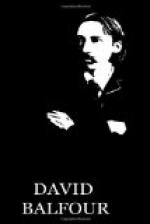“And let us go see him, then,” said I.
“If it is your pleasure,” said Catriona. These were early days.
He was lodged in the same quarter of the city with his chief, in a great house upon a corner; and we were guided up to the garret where he lay by the sound of Highland piping. It seemed he had just borrowed a set of them from Bohaldie to amuse his sickness; though he was no such hand as was his brother Rob, he made good music of the kind; and it was strange to observe the French folk crowding on the stairs, and some of them laughing. He lay propped in a pallet. The first look of him I saw he was upon his last business; and, doubtless, this was a strange place for him to die in. But even now I find I can scarce dwell upon his end with patience. Doubtless, Bohaldie had prepared him; he seemed to know we were married, complimented us on the event, and gave us a benediction like a patriarch.
“I have been never understood,” said he. “I forgive you both without an after-thought;” after which he spoke for all the world in his old manner, was so obliging as to play us a tune or two upon his pipes, and borrowed a small sum before I left. I could not trace even a hint of shame in any part of his behaviour; but he was great upon forgiveness; it seemed always fresh to him. I think he forgave me every time we met; and when after some four days he passed away in a kind of odour of affectionate sanctity, I could have torn my hair out for exasperation. I had him buried; but what to put upon his tomb was quite beyond me, till at last I considered the date would look best alone.
I thought it wiser to resign all thoughts of Leyden, where we had appeared once as brother and sister, and it would certainly look strange to return in a new character. Scotland would be doing for us; and thither, after I had recovered that which I had left behind, we sailed in a Low Country ship.
And now, Miss Barbara Balfour (to set the ladies first) and Mr. Alan Balfour, younger of Shaws, here is the story brought fairly to an end. A great many of the folk that took a part in it, you will find (if you think well) that you have seen and spoken with. Alison Hastie in Limekilns was the lass that rocked your cradle when you were too small to know of it, and walked abroad with you in the policy when you were bigger. That very fine great lady that is Miss Barbara’s name-mamma is no other than the same Miss Grant that made so much a fool of David Balfour in the house of the Lord Advocate. And I wonder whether you remember a little, lean, lively gentleman in a scratchwig and a wraprascal, that came to Shaws very late of a dark night, and whom you were awakened out of your beds and brought down to the dining-hall to be presented to, by the name of Mr. Jamieson? Or has Alan forgotten what he did at Mr. Jamieson’s request—a most disloyal act—for which, by the letter of the law, he might be hanged—no less than drinking the king’s health across the water? These were strange doings in a good Whig house! But Mr. Jamieson is a man privileged, and might set fire to my corn-barn; and the name they know him by now in France is the Chevalier Stewart.




